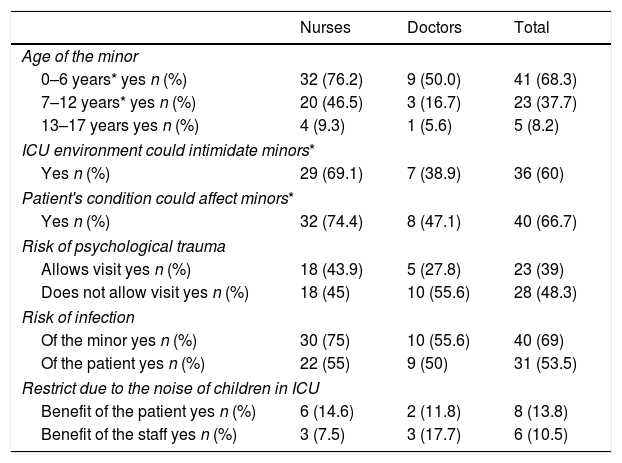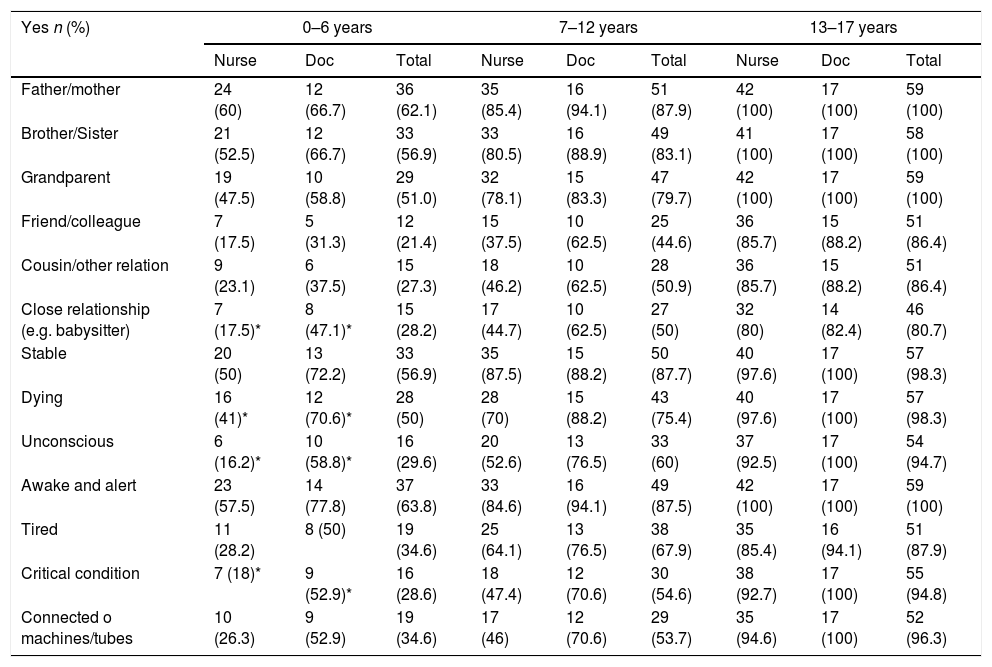To determine the opinion of healthcare staff (HS) on the presence of minors in an adult intensive care unit.
MethodTransversal descriptive research study in an adult intensive care unit with 62 people, between September/December 2017. The Knutsson questionnaire was used with 10 closed questions with space for comments, and 2 open questions.
Selection of the respondents was by means of convenience sampling. Descriptive statistics with absolute frequencies and percentages. Chi-squared-test or Fisher. Significance p<.05.
Results61 questionnaires were collected: 70.5% nursing staff (NS).
Fifty percent of medical staff (MS) would restrict the entry of 0–6-year old minors versus 76.2% NS (p=.04). Of the MS, 16.7% would restrict the visits of minors between the ages of 7 and 12 versus 46.5% NS (p=.02).
Seventy-five percent of HS thought that minors’ access could entail a risk of infection for the children. Of the survey respondents, 60% believed that the environment could intimidate the minor, and 66.7% thought that the patient's condition could affect the child. They would permit 0–6-year-old minors to access the ICU if the patient was dying (70.6% MS/41% NS, p=.04), awake and alert (77.8% MS/57.5% NE) and close relatives (parents) (66.7% MS/60% NS).
ConclusionsHS support minors visiting an adult intensive care unit if they are >6 years old. HS show a more positive attitude towards visits in special circumstances such as close relatives, awake patient, and death regardless of their age. The reasons for restriction of visits are: environment, patient's condition and risk of infection.
NS show a less positive attitude in relation to visits.
Determinar las opiniones del equipo asistencial (EA) ante la visita de menores en una unidad de cuidados intensivos de adultos.
MétodoEstudio descriptivo transversal en una unidad de cuidados intensivos de adultos con un EA de 62 personas, entre septiembre-diciembre 2017. Se utilizó el cuestionario de Knutsson con 10 preguntas cerradas con espacio para comentarios y 2 abiertas.
Selección de los encuestados mediante muestreo de conveniencia. Estadística descriptiva con frecuencias absolutas y porcentajes. Prueba de Chi2 o Fisher. Significación p<0,05.
ResultadosSe recogieron 61 cuestionarios: 70,5% correspondían a personal de enfermería (PE).
El 50% de profesionales médicos (PM) restringiría la entrada de menores de 0-6 años frente al 76,2% de PE (p=0,04). Entre 7-12 años, el 16,7% de PM la limitaría frente al 46,5% del PE (p=0,02).
El 75% del EA opinó que la entrada podía significar riesgo de infección para el menor. El 60% creyó que el entorno podía intimidarlo y el 66,7% que podía impresionarlo el estado del paciente. Permitirían la entrada de menores de 0-6 años, si el paciente se estuviera muriendo (70,6% PM y 41% PE) p=0,04), despierto (77,8% PM y 57,5% PE) o parentesco cercano (padre/madre) (66,7% PM y 60% PE).
ConclusionesEl EA es partidario de la visita con una edad >6 años. En circunstancias especiales: parentesco cercano, paciente despierto o muerte son más permisivos independientemente de la edad. Los motivos de restricción son: entorno, estado y riesgo de infección.
El PE es más restrictivo ante la visita.











